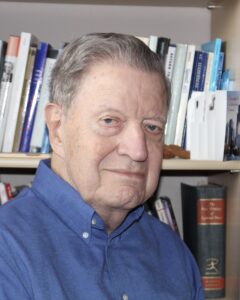
Jack McLeod, Maier-Bascom Professor Emeritus and a leader in political communication research, died January 28, 2024, at Agrace Hospice in Fitchburg, Wisconsin. He was 93.
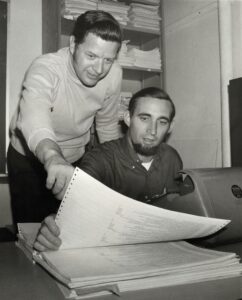
Through his 38-year career in the University of Wisconsin-Madison School of Journalism and Mass Communication, Jack left a legacy of inspiring teaching, thoughtful mentorship and field-leading research. His scholarship focused on political communication, mass media effects, public opinion and the role of media in broadening democratic participation.
“Jack was a towering figure in communication research and one of the most humble, gentle spirits I’ve encountered in my academic career,” said Kathleen Bartzen Culver, SJMC’s director and James E. Burgess Chair in Journalism Ethics. “He left his imprint on the field through his own prolific scholarship and through the careers of the more than 70 doctoral students he advised and countless others he mentored.”
Jack earned his bachelor’s degree from UW-Madison and despite his early dream of becoming a foreign or Washington correspondent, he found his calling in research and went on to earn a master’s degree in journalism from UW-Madison in 1953. Since advanced communication and journalism programs during that time were early in their development, Jack chose to continue his education, explore social psychology and apply those concepts to communication.
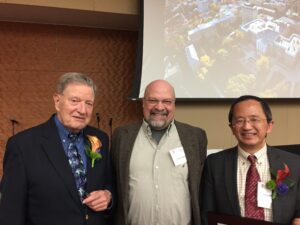
After earning his Ph.D. in social psychology at the University of Michigan, Jack joined the UW faculty in 1962 and shaped the SJMC into a research and doctoral training powerhouse. Through his sociological studies, Jack had realized the importance of experiential learning and the need to expose students to the real world, infusing the SJMC doctoral program with relevance and excellence that would shape scholars for generations to come.
Jack was considered an icon in the field and his impact on political communication research was far-reaching. Among many other awards, he was named an International Communication Association fellow and received the Association for Education and Journalism and Mass Communication’s Deutschmann Award, the highest research honor the organization bestows.
During his time in the SJMC, Jack served as director of the Mass Communication Research Center for 34 years. His strong belief that the best scholars learn by doing was and still is a cornerstone of the MCRC.
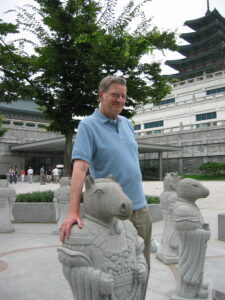 “There are a handful of scholars who can match Jack’s wide and lasting impact on the field of communication,” said Dhavan Shah, Jack M. McLeod Professor of Communication Research and Director of the MCRC. “He created new field spaces, defined them through his research, and provided training for so many graduate students who went on to shape the field, only extending his already-considerable global influence. His pioneering work continues to define political communication and media effects research, with his students (and their students) found at major universities throughout the world. His legacy in the field is assured because his advisees and mentees are legion.”
“There are a handful of scholars who can match Jack’s wide and lasting impact on the field of communication,” said Dhavan Shah, Jack M. McLeod Professor of Communication Research and Director of the MCRC. “He created new field spaces, defined them through his research, and provided training for so many graduate students who went on to shape the field, only extending his already-considerable global influence. His pioneering work continues to define political communication and media effects research, with his students (and their students) found at major universities throughout the world. His legacy in the field is assured because his advisees and mentees are legion.”
Despite his iconic status in the field, Jack never had an ego and was a rare combination of incredible accomplishment and remarkable humility.
“Jack was incredibly humble and truly generous with his talents, despite his stature in the field, which surely led to tremendous demands,” said Ohio State University Professor William “Chip” Eveland, a 1997 doctoral graduate. “The field of communication has grown tremendously since Jack McLeod joined it in the 1960s, in no small part because of his contributions. We would be better still today if there were more people like Jack McLeod. I will miss him and his influence.”
In addition to his research legacy, Jack is remembered for his mentorship. Jack advised more than 70 Ph.D. students, grounding them theoretically and methodologically and inspiring them to tackle critical questions related to the role of communication in democratic participation.
“As a co-author, employer, mentor and teacher of mine, Jack McLeod was without equal. He taught me that the advancement of academic research is best accomplished through a true partnership,” said Ohio State University Professor Emerita Carroll Glynn, a 1983 doctoral graduate. “Our cohort was so fortunate to experience Jack’s leadership and guidance in our graduate education.”
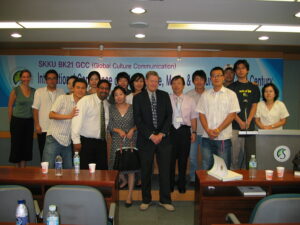
In 1991, Jack was recognized for his outstanding mentorship and awarded ICA’s B. Aubrey Fisher Mentorship Award, one of ICA’s top honors. The students he guided have gone on to successful and rewarding careers in political communication and research.
Sir Brian Donnelly, retired British diplomat, was one of Jack’s mentees while earning his master’s degree. “Jack introduced me to the world of mass communication research and taught me that journalism was about much more than writing. He became the supervisor for my master’s thesis and proved to be a wise, kind and compassionate mentor,” Donnelly said. “I always relished his sharp and penetrating analyses of the U.S. political scene, often drawing on his own distinguished scholarship. I feel proud to have known and worked with him and will greatly miss his enduring friendship.”
Jack’s legacy as a researcher, mentor and friend will be felt for years to come not only within Vilas Hall, but around the globe. Known for his gentle warmth, Jack is admired by colleagues around the world for his character and generosity.
“Jack was a father figure to me. This is because Jack genuinely cared about people and had a tremendous capacity to support them,” said Zhongdang Pan, professor of communication science at UW-Madison. “Jack enjoyed travel and collaboration with scholars from all over the world. He pushed for more holistic and integrative perspectives. It was one of the intellectual attributes that made it possible for him to advise and work with so many Ph.D. advisees from all over the world. I treasure all my fond memories of working with him, chatting with him, and traveling with him. I consider myself truly lucky to have him as my mentor.”
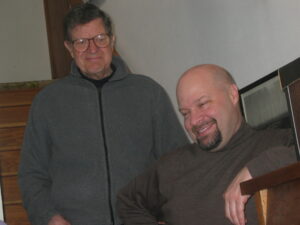 Colleagues at the School will deeply miss Jack, especially his son, Evjue Centennial Professor Doug McLeod. His knack for connecting with colleagues on a deeply personal level was unmatched.
Colleagues at the School will deeply miss Jack, especially his son, Evjue Centennial Professor Doug McLeod. His knack for connecting with colleagues on a deeply personal level was unmatched.
“Jack was generous, affable, funny, and gregarious. He loved talking about politics and the state of the world, sneaking good Scotch into Badger football games, telling stories about his travels and travails, and, of course, sharing ideas about communication research,” Shah said. “He listened carefully, spoke softly, and always greeted you with a wry smile, which is why everyone felt so welcome around him. He didn’t just study communication and community, he used communication to create community.”
In honor of Jack’s tremendous influence on graduate students, SJMC established the Jack M. McLeod Graduate Student Fund to support future students through scholarships. Memorial gifts in Jack’s honor can be made here.
Through his scholarship, kindness, generosity and wit, Jack McLeod has left a permanent imprint on the field, in the halls of Vilas and on his mentees around the world.